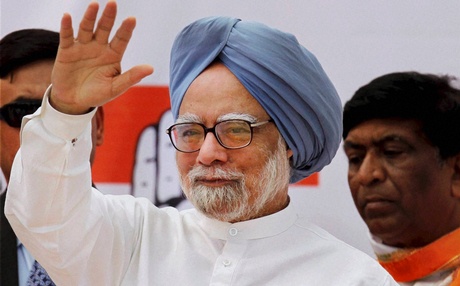
Vansada, December 10: Adding to Congress chief Sonia Gandhi’s blistering attack on Narendra Modi’s performance, Prime Minister Manmohan Singh on Sunday said the Gujarat government worked for a handful of corporates and called for “liberating” the State from divisive politics.
Addressing his first election rally in South Gujarat’s tribal district of Vansda, he touched upon the “insecurity” of minorities — something Sonia Gandhi chose to avoid given that the issue had cost the party dearly in the 2007 elections.
He spoke at length on the issue, though he also pooh-poohed Mr. Modi’s claims of development by reeling out statistics of Gujarat’s poor human development index. “Unlike the Opposition we do not play politics of dividing the people. Such type of politics is bad and cannot benefit a political party in the longer run,” the Prime Minister said.
He asserted, without naming Mr. Modi, that, “The time has come to liberate Gujarat from such politics and prevent those from returning to power who have been trying to get votes by dividing our society and country.”
The Congress had always worked to unite the people. “We know that if there are divisions in our people on the lines of religion, caste, creed and clan...Then we cannot surge ahead as a nation,” he said.
“We have been getting regular complaints that minorities and some other segments of society are feeling insecure in the State. Even a few State government officers have filed such complaints, which is very unfortunate for our country,” Singh said. “It is a matter of great regret that such an environment prevails in the land of Mahatma Gandhi.”
Dr. Singh pointed out, “The foundation of Gujarat’s development was laid by the Congress governments in 70s. It is due to the hardworking people of this State that it is considered to be developing.”
He asked if the benefits were reaching minorities, Scheduled Tribes and Scheduled Castes. “It is very unfortunate that in a developed State like Gujarat, 41 per cent women are victims of malnourishment. If one looks at women in the 15-50 age group, we find that 55 per cent women are anaemic,” Dr. Singh said.
“If we take a look at the top 20 States in terms of human development Gujarat ranks 18th. You must think what the reason behind this is.”
The Prime Minister said the public health sector was in a pathetic state and new employment opportunities were not being created.
He also raised the issue of incomplete work of Sardar Sarovar Narmada Dam canal and water problems being faced by people in the State.
“In the last 10 years, only 26 per cent of work of Sardar Sarovar Narmada dam project has been completed. If Congress forms the government in the State, then we will speed up the work and try our best to bring happiness in each and every village and provide all the benefits to the farmers which they are truly entitled for,” Dr. Singh said.





Comments
Add new comment